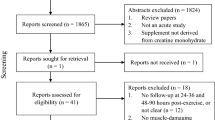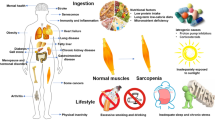Abstract
We examined the efficacy of 2-year enzyme replacement therapy (ERT) using recombinant human α-glucosidase (GAA; Myozyme®) in five long-term ventilator-dependent adults and aged patients with advanced, late-onset glycogen storage disease type II (GSDII, also known as Pompe disease). Although all patients had advanced respiratory failure and were ventilator-dependent for more than 6 years, four showed obvious improvements in muscle strength, pulmonary function, and activities of daily living after ERT. Improvement in each parameter was more prominent in the first year than in the second year. Values in the second year were still significantly better than those at study entry and indicate stabilization in the clinical status of all patients. These results suggest that ERT continues to be effective in the second year of treatment even in patients suffering from advanced late-onset GSDII disease with severe respiratory failure.



Similar content being viewed by others
References
Bach JR (2004) Pulmonary defence mechanisms and cough peak flow. In: Management of patients with neuromuscular disorders. Hanley & Belfus, Philadelphia, pp 193–199
Case LE, Koeberl DD et al (2008) Improvement with ongoing enzyme replacement therapy in advanced late-onset Pompe disease: a case study. Mol Genet Metab 95:233–235
Engel AG, Hirschhorn RH, Hue ML (2004) Acid maltase deficiency. In: Engel AG, Franzini-Armstrong C (eds) Myology, 3rd ed. McGraw-Hill, New York, pp 1559–1586
Hermans MM, van Leenen D et al (2004) Twenty-two novel mutations in the lysosomal alpha-glucosidase gene (GAA) underscore the genotype-phenotype correlation in glycogen storage disease type II. Hum Mutat 23:47–56
Hirshhorn R, Reuser AJJ (2001) Glycogen storage disease type II; acid alpha-glycosidase (acid maltase) deficiency. In: Scriver CR, Baudet AL, Sly WS (eds) The metabolic and molecular bases of inherited disease. McGraw-Hill, New York, pp 3389–3420
Hosoda T, Yanagisawa K (2000) Handbook of physiotherapy, 3rd ed (in Japanese). Igaku-Shoin, Tokyo
Kishnani PS, Nicolino M et al (2006) Chinese hamster ovary cell-derived recombinant human acid alpha-glucosidase in infantile-onset Pompe disease. J Pediatr 149:89–97
Kishnani PS, Corzo D et al (2008) Recombinant human acid alpha-glucosidase: major clinical benefits in infantile-onset Pompe disease. Neurology 68:99–109
Kondo I, Fukuda M (2000) Gross motor functional measure manual (in Japanese). Igaku-Shoin, Tokyo
Lam CW, Yuen YP et al (2003) Juvenile-onset glycogen storage disease type II with novel mutations in acid alpha-glucosidase gene. Neurology 25(60):715–717
Merk T, Wibmer T et al (2007) Enzyme replacement therapy in Pompe’s disease. Med Klin 102:570–573
Merk T, Wibmer T et al (2009) Glycogen storage disease type II (Pompe disease)-influence of enzyme replacement therapy in adults. Eur J Neurol 16:274–277
Nicolino M, Byrne B et al (2009) Clinical outcomes after long-term treatment with alglucosidasealfa in infants and children with advanced Pompe disease. Genet Med 11:210–219
Orlikowski D, Pellegrini N et al (2011). Recombinant human acid alpha-glucosidase (rhGAA) in adult patients with severe respiratory failure due to Pompe disease. Neuromuscul Disord 21:477–782
Pascual-Pascual SI, Rubio P et al (2006) Sudden deterioration in nonclassical infantile-onset Pompe disease responding to alglucosidase alfa infusion therapy: a case report. J Inherit Metab Dis 29:763
Pipo JR, Feng JH et al (2003) New GAA mutations in Japanese patients with GSDII (Pompe disease). Pediatr Neurol 29:284–287
Rossi M, Parenti G, Della Casa R (2007) Long-term enzyme replacement therapy for Pompe disease with recombinant human alpha-glucosidase derived from Chinese hamster ovary cells. J Child Neurol 22:565–573
Sasaki M, Sakuragawa N, Nonaka I (1992) A case of childhood-onset glycogen storage disease type II with 10-year-old onset (in Japanese). SyonikaRinsho 55:430–436
Strothotte S, Strigl-Pill N et al (2010) Enzyme replacement therapy with alglucosidasealfa in 44 patients with late-onset glycogen storage disease type 2: 12-month results of an observational clinical trial. J Neurol 257:91–97
Tsujino S, Huie M et al (2000) Frequent mutations in Japanese patients with acid maltase deficiency. Neuromuscul Disord 10:599–603
Tsunoda H, Ohshima T et al (1996) Acid alpha-glucosidase deficiency: identification and expression of a missense mutation (S529V) in a Japanese adult phenotype. Hum Genet 97:496–499
Ueki K, Nagasawa K, Yamamoto E (2007) Bite force and maxillofacial morphology in patients with Duchenne-type muscular dystrophy. J Oral Maxillofac Surg 65:34–39
van Capelle CI, Winkel LP et al (2008) Eight years experience with enzyme replacement therapy in two children and one adult with Pompe disease. Neuromuscul Disord 18:447–452
van der Ploeg AT, Clemens PR et al (2010) A randomized study of alglucosidasealfa in late-onset Pompe's disease. N Engl J Med 362:1396–1406
Winkel LP, van den Hout JM et al (2004) Enzyme replacement therapy in late-onset Pompe’s disease: a three-year follow-up. Ann Neurol 55:495–502
Yamamoto T, Ohsaki Y, Nanba E, Tsujino S, Sakuragawa N, Martiniuk F, Ninomiya H, Oka A, Ohno K, Ravaglia S, Danesino C et al (2008) Enzyme replacement therapy in severe adult-onset glycogen storage disease type II. Adv Ther 25:820–829
Yamazaki M, Shintani M et al (1992) A case of acid maltase deficiency (juvenile type)-immunohistological and biochemical study (in Japanese). Rinsho Shinkeigaku 32:1266–1271
Acknowledgments
This study was supported partly by the Research on Psychiatric and Neurological Diseases and Mental Health of Health and Labour Sciences research grants; partly by Research on Intractable Diseases of Health and Labor Sciences research grants; partly by a Research Grant for Nervous and Mental Disorders (20B-12, 20B-13) from the Ministry of Health, Labour and Welfare; partly by an Intramural Research Grant (23-4, 23-5) for Neurological and Psychiatric Disorders from NCNP; partly by KAKENHI (20390250); partly by Research on Publicly Essential Drugs and Medical Devices of Health and Labor Sciences research grants; partly by the Program for Promotion of Fundamental Studies in Health Sciences of the National Institute of Biomedical Innovation (NIBIO); and partly by a grant from the Japan Foundation for Neuroscience and Mental Health.
Author information
Authors and Affiliations
Corresponding author
Additional information
Communicated by: Ed Wraith
Competing interests: None declared.
Electronic supplementary material
Below is the link to the electronic supplementary material.
Supplementary table
Normal values for grip power, pinch power, and occlusal force. (DOC 29 kb)
Supplementary figure
Effects of ERT on anti-rhGAA antibody titers. Titers of other patients than patient 1 decreased at 10 weeks after ERT initiation. Data are presented as mean ± SEM. (PPTX 49 kb)
Rights and permissions
About this article
Cite this article
Furusawa, Y., Mori-Yoshimura, M., Yamamoto, T. et al. Effects of enzyme replacement therapy on five patients with advanced late-onset glycogen storage disease type II: a 2-year follow-up study. J Inherit Metab Dis 35, 301–310 (2012). https://doi.org/10.1007/s10545-011-9393-6
Received:
Revised:
Accepted:
Published:
Issue Date:
DOI: https://doi.org/10.1007/s10545-011-9393-6




